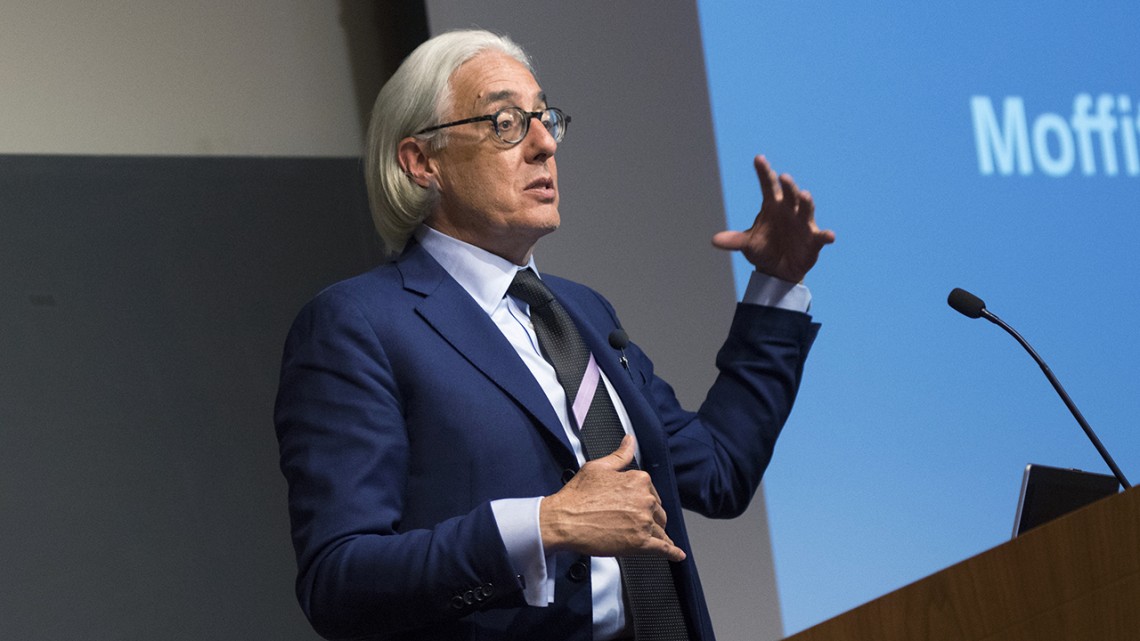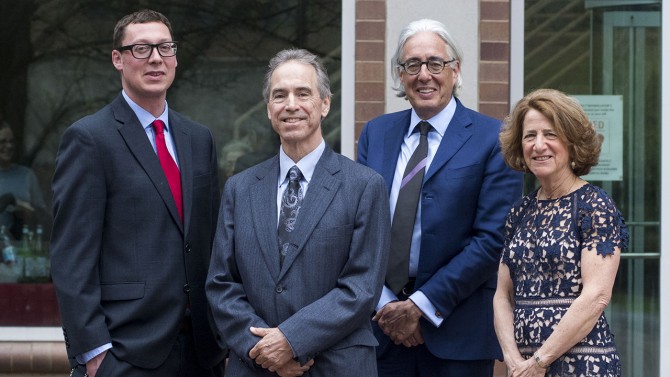
Avshalom Caspi ’83, Ph.D. ’86, delivers the annual John Doris Memorial Lecture April 25 in the Biotechnology Building.
Doris lecture charts mental disorders across life span
By Stephen D’Angelo
Focusing on youth mental health is “actually a lifelong investment” in improving the overall population’s health and well-being, said Avshalom Caspi ’83, Ph.D. ’86, in the annual John Doris Memorial Lecture. The talk, sponsored by the Bronfenbrenner Center for Translational Research, was held April 25 in the Biotechnology Building.
Caspi is a professor of psychology and neuroscience at Duke University, and professor of personality development at the Institute of Psychiatry, Psychology and Neuroscience at King’s College, London.
In his talk, “Charting Mental Disorders From Childhood to Midlife: Lessons for Nosology, Etiology, Intervention and Public Understanding of Mental Disorders,” Caspi discussed findings from the Dunedin Multidisciplinary Health and Development Study, one of the longest current studies of mental disorders. Caspi joined the study in the late 1980s, shortly after completing his Ph.D.
Mental health professionals, Caspi said, typically encounter a patient at one point in their life and tend to diagnose based on this cross-sectional view of the person’s life. This “promotes the idea that patients are adequately characterized by their current presenting diagnosis,” he said.
One result, Caspi said, is most research hypotheses and most treatment protocols tend to be tailored to one or two presenting diagnoses. Researchers and professionals then use these diagnoses to set up case control comparisons in order to gather information to tailor treatments.
“All this has given rise to diagnosis-specific clinics, diagnosis-specific societies, diagnosis-specific journals and, in some instances, diagnosis-specific funding agencies,” Caspi said. “But what would happen if instead of adopting this cross-sectional view we in fact adopted a life-course, lifelong view of mental disorders?”
The Dunedin Study does just this, looking at a long-running cohort study of 1,037 people born between 1972 and 1973 in Dunedin, New Zealand. Each was assessed 13 times between the ages of 3 and 44.
The data and subsequent findings have helped researchers see and better understand how mental disorders evolve from childhood to midlife, Caspi said. This includes emerging details on when mental disorders develop, how common they are and how they diversify with time.
“One of the things we’ve learned is that mental disorder affects virtually everyone eventually,” he said. “Disorders typically onset by adolescence and, if so, appear to persist thereafter. Nobody gets one disorder and keeps it. Over decades, what individuals in fact experience are many changing disorder types.”
Caspi said this has important implications within the realm of research for etiology – the study of the causes, origins or reasons behind the way things are, or the way they function. This would greatly impact research within genetics, neuroscience and developmental psychopathology.
According to Caspi, this greater understanding has important implications on prevention, underscoring the importance of targeting prevention in early life. This is due to growing evidence that young people who experience mental disorders tend to develop noninfectious and neurodegenerative diseases as they age.
If this evidence is accurate, treating mental disorders serves two essential public health goals.
“First, the treating of mental disorders – the most prevalent health problem in the first part of the life course – offers an opportunity to prevent disability among young people to enhance their well-being and their capacity to drive the economy and to shoulder the burden of the elderly,” he said, pointing out the perfect demographic storm: increased life span and an aging population, combined with lowering birth rates.
“Second,” he said, “treating mental disorders may actually be a target for slowing aging and preventing age-related diseases, not only for increasing life span but for increasing health span – that is, years lived without disability, which is our ultimate goal.”
The event also honored John Eckenrode, professor in the Department of Human Development and the founding director of the Bronfenbrenner Center. He is retiring this spring; his Cornell career has spanned more than 35 years.
“It is impossible to fully capture the many ways that John has contributed to the college, the impact that he has had, and the way that he has moved the college forward in essential and innovative ways,” said Rachel Dunifon, interim dean of the College of Human Ecology. “We are so grateful that he chose to spend his career at Cornell.”
Stephen D’Angelo is assistant director for communications for the College of Human Ecology.
Media Contact
Get Cornell news delivered right to your inbox.
Subscribe

